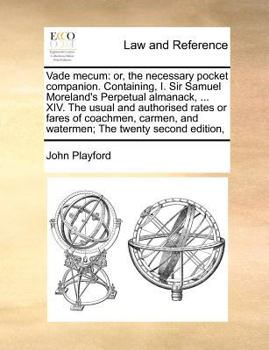Vade mecum: or, the necessary pocket companion. Containing, I. Sir Samuel Moreland's Perpetual almanack, ... XIV. The usual and authorised rates or ... and watermen; The twenty second edition,
Select Format
Select Condition 
Based on Your Recent Browsing
Book Overview
No Synopsis Available.
Format:Paperback
Language:English
ISBN:0312278462
ISBN13:9780312278465
Release Date:January 1981
Publisher:St. Martins Press-3PL
Length:352 Pages
Weight:0.74 lbs.
Dimensions:0.9" x 5.4" x 8.3"
Customer Reviews
6 customer ratings | 5 reviews
There are currently no reviews. Be the first to review this work.





















